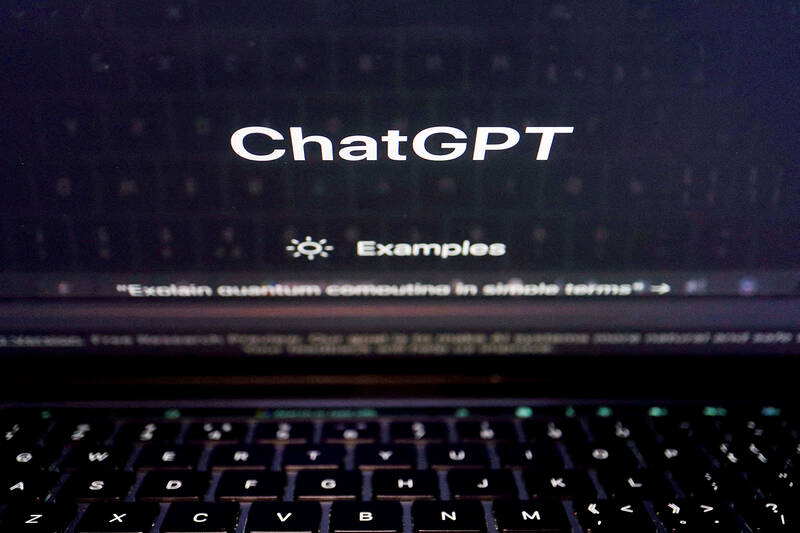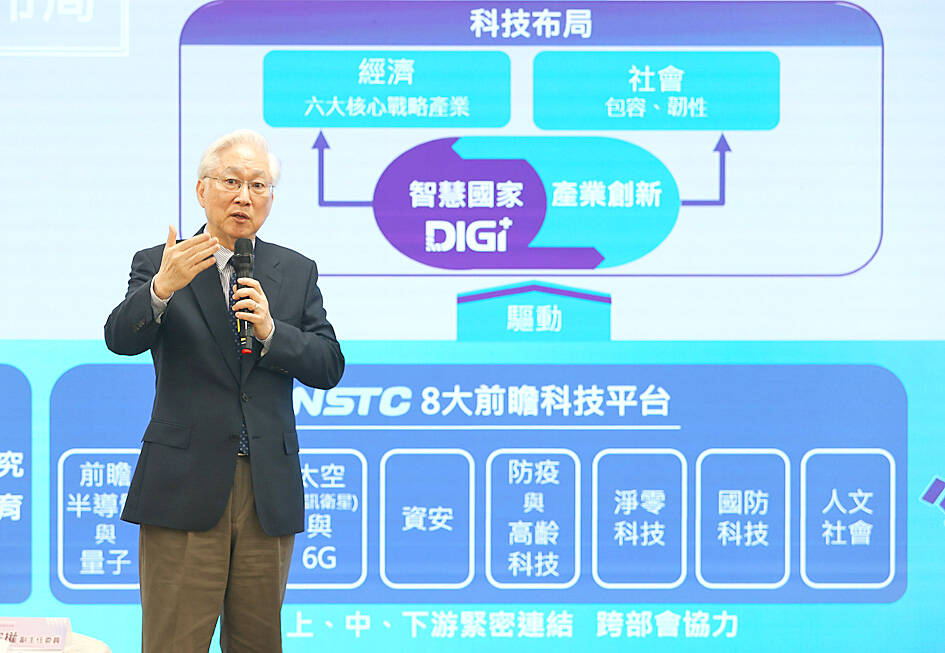Taiwan is to develop its own version of chat generative pretrained transformer (ChatGPT) to prevent an artificial intelligence (AI) system trained to offer biased information from China or authoritarian regimes from dominating the industry, Minister of Science and Technology Wu Tsung-tsong (吳政忠) said yesterday.
San Francisco-based OpenAI Laboratory has garnered 100 million users worldwide within two months of launching the chatbot. Chinese search engine Baidu Inc (百度) has announced that it is to launch a similar app in two months.
The council is budgeting NT$34.9 billion (US$1.15 billion) to set up eight major technology platforms: AI, semiconductor and quantum technology, space and satellite communications, cybersecurity, precision healthcare technology, net zero emissions technology, national defense technology, as well as the humanities and social sciences, Wu said.

Photo: Reuters
Most of the funding — NT$11.9 billion — would be used to develop net zero emissions technology, followed by NT$8.3 billion to develop semiconductor technology, he said.
ChatGPT communicates in English, while a similar system developed by Baidu is expected to communicate in simplified Chinese, Wu said, adding that as competition between democratic nations and authoritarian regimes intensifies, Taiwan, as democratic nation, could contribute by developing a system that communicates in traditional Chinese.
“ChatGPT generally uses public information to generate responses, but the system can be tweaked manually so that it can generate specific responses to certain questions,” he said. “Taiwan would create its own version of ChatGPT to avoid AI systems trained to provide biased information from dominating the industry.”

Photo: CNA
Taiwan can compete in AI by investing more in talent, Wu said, adding that it has never sought to surpass other nations in terms of funding research and development in any emerging technology.
Meanwhile, Wu said that Taiwan would continue training talent and bringing in overseas funding if it is necessary to maintain its leading position in the semiconductor industry, which is expected to be a core technology worldwide in the next 20 years.
“Through the training of talent in other countries, we hope it will draw talent and start-up companies to establish operational bases in Taiwan and join the industries in which Taiwan is a leader,” he said.
The council is to establish an information security technology research center to advance research of cybersecurity issues, Wu said.
The Taiwan Space Agency and the Industrial Technology Research Institute are to develop a low-orbit satellite system, he said.
“Scientists have completed the preliminary designs of the launch pads for two experimental satellites owned by the Taiwan Space Agency, with 80 percent of the components being made in Taiwan,” Wu said, adding that a more detailed design is to be delivered by the end of this year.
He also confirmed Taiwan-US science and technology collaboration meetings are to be held in May.
The meetings were scheduled to be held in November last year in Taiwan, but they were postponed due to the US midterm elections.
The US delegation that was scheduled to arrive in Taiwan last year included officials and representatives from the White House, the US Department of State, the National Science Foundation, the National Institute of Health, the National Institute of Standards and Technology and the National Oceanic and Atmospheric Administration, the council said.
Members of the US delegation would exchange views and sign cooperation agreements on major issues with Taiwanese officials and scientists during the meetings, it said.
The National Science and Technology Council and the US National Science Foundation are to hold a technology cooperation annual meeting, it added.
The delegation would visit the Hsinchu Science Park, Taiwan Space Agency, Taiwan Semiconductor Research Institute, National Center for High-Performance Computing and the Shalun Smart Green Energy Science City in Tainan, the council said.

CHAOS: Iranians took to the streets playing celebratory music after reports of Khamenei’s death on Saturday, while mourners also gathered in Tehran yesterday Iranian Supreme Leader Ayatollah Ali Khamenei was killed in a major attack on Iran launched by Israel and the US, throwing the future of the Islamic republic into doubt and raising the risk of regional instability. Iranian state television and the state-run IRNA news agency announced the 86-year-old’s death early yesterday. US President Donald Trump said it gave Iranians their “greatest chance” to “take back” their country. The announcements came after a joint US and Israeli aerial bombardment that targeted Iranian military and governmental sites. Trump said the “heavy and pinpoint bombing” would continue through the week or as long

TRUST: The KMT said it respected the US’ timing and considerations, and hoped it would continue to honor its commitments to helping Taiwan bolster its defenses and deterrence US President Donald Trump is delaying a multibillion-dollar arms sale to Taiwan to ensure his visit to Beijing is successful, a New York Times report said. The weapons sales package has stalled in the US Department of State, the report said, citing US officials it did not identify. The White House has told agencies not to push forward ahead of Trump’s meeting with Chinese President Xi Jinping (習近平), it said. The two last month held a phone call to discuss trade and geopolitical flashpoints ahead of the summit. Xi raised the Taiwan issue and urged the US to handle arms sales to

State-run CPC Corp, Taiwan (CPC, 台灣中油) yesterday said that it had confirmed on Saturday night with its liquefied natural gas (LNG) and crude oil suppliers that shipments are proceeding as scheduled and that domestic supplies remain unaffected. The CPC yesterday announced the gasoline and diesel prices will rise by NT$0.2 and NT$0.4 per liter, respectively, starting Monday, citing Middle East tensions and blizzards in the eastern United States. CPC also iterated it has been reducing the proportion of crude oil imports from the Middle East and diversifying its supply sources in the past few years in response to geopolitical risks, expanding

Pro-democracy media tycoon Jimmy Lai’s (黎智英) fraud conviction and prison sentence were yesterday overturned by a Hong Kong court, in a surprise legal decision that comes soon after Lai was jailed for 20 years on a separate national security charge. Judges Jeremy Poon (潘兆初), Anthea Pang (彭寶琴) and Derek Pang (彭偉昌) said in the judgement that they allowed the appeal from Lai, and another defendant in the case, to proceed, as a lower court judge had “erred.” “The Court of Appeal gave them leave to appeal against their conviction, allowed their appeals, quashed the convictions and set aside the sentences,” the judges